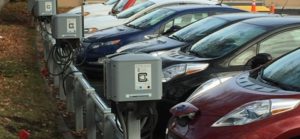
Avista Utilities is committed to effective support for plug-in electric vehicle (PEV) adoption in its service territories. Avista first installed three charging stations with a total of five connection ports in 2010 at its headquarters facility at Mission Campus in Spokane, at the Steam Plant office in downtown Spokane, and Spokane City Hall, all free for public and employee use. Avista's commitment to charging continued in 2015 with the installation of 8 additional stations for employee PEV charging at its Mission campus and a commitment to match employee PEV adoption and public accessibility in the next four years with an additional 40 port connections at various Avista facilities. Avista maintains three PEVs in its headquarters fleet which are available for employees to use for business purposes, and as a member of the Edison Electric Institute (EEI), Avista has committed 5% of its annual fleet budget to electrification. Most recently, Avista successfully filed and received approval from the Washington Utilities and Transportation Commission to proceed with a pilot program to install electric vehicle supply equipment (EVSE) in its Eastern Washington service territory.
Recently, the Washington State Transportation and Utility Commission approved a $3,000,000 pilot program for Avista to install charging infrastructure for electric vehicles (EVs) at residential and commercial customer locations over a two year period. The chargers (EVSE) will be owned and maintained by Avista, with target installations at 120 residential homes and approximately 80 workplace and public locations, including 7 high-power DC fast chargers to enable regional EV travel. This pilot will help Avista understand emerging EV charging needs and behaviors, and how future impacts may be best managed on Avista’s system. It will also support growing EV adoption and inform long-term planning to improve efficiencies, maximize benefits and minimize costs in support of electric transportation.
Program Benefits to Avista Customers and the Community
Fuel and Maintenance Costs
Electric vehicles are a proven technology that provide significant savings on fuel and maintenance costs. For example, transportation fuel costs per household average $2,340 per year assuming gasoline at $2.50 a gallon, compared to $495 per year using electricity at 9 cents per kilowatt-hour.
Environmental Factors
EV’s make a big difference in protecting the environment by emitting zero tailpipe emissions locally, and 80% less CO2 into the air from total electricity generation sources that supply the power for Avista’s system.
Electric Load Management
In the future, the increased adoption of EVs could strain the system during on-peak times and increase costs. Alternatively, if EV charging can be shifted to times of low system demand (“off-peak”), then the system is not as strained and existing infrastructure can be better utilized. This would result in a more efficient, less costly and more reliable grid, benefiting all of Avista’s electric customers. It may be possible to shift most of EV charging to off-peak times and still satisfy the customer’s EV charging needs, for example by mostly charging overnight. This is one of the main learning objectives of the EVSE Pilot.